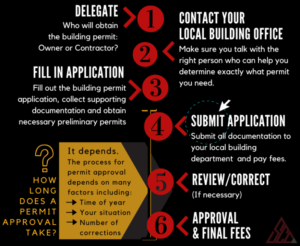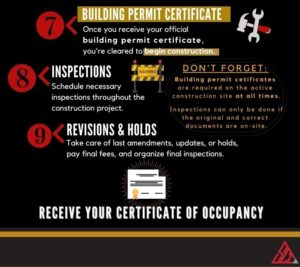
Permitting is far from the easiest part of a custom home building project. While it may feel like a bureaucratic maze to navigate (and it is), the local building permit process exists to keep our homes and neighborhoods safe.
It is impossible to define a catch-all process for permitting, but one thing to realize is that permits and inspections aren’t as scary as they may seem.
What is a building permit?
A building permit is an official approval or permission that the local county or city authorities must authorize before construction or remodeling can begin.
This can be for large construction projects or simple home renovations on patios or garages.
The reason local authorities have permitting is to ensure that your building project is built safely and poses minimal risks to neighbors or to the community as a whole.
Home projects may involve working around systems such as water or sewer lines, electrical, or gas lines. These systems are complex and designed to support communities. So, regulating who may be working on these complex systems is important to mitigate the risks that might occur during construction projects.
To obtain building permits, there are many steps to follow to ensure you have the rights, the knowledge, and the ideal situation to proceed with your building project.
Overview of the new home or residential building permit process
While each county and certain municipalities have their own processes, in general, these are the steps you can follow:

1. Delegate: Decide who will obtain the building permits: Contractor or Property Owner
2. Contact the local building office or “Department of Buildings” (DOB) and describe your project to determine what permit and which preliminary permits you will need.
3. Fill out the required application for your permit and 0btain preliminary permits. This may include:
-
- Complete House Plans: Foundation, Floor, Roof, and other Plans
- Grading Permit (Site Engineering)
- Health Permit
- Electrical Permit
- Gas Permit
- Mechanical Permit
- Occupancy Permit
- Plumbing Permit
- VDOT Entrance Permit (if your lot has access to a state-maintained road)
4. Submit the building permit application + necessary fees
5. Review Period and/or Corrections
6. Approved + Pay Final Fees
7. Receive official permit certificate & post building permit certificate at the worksite
8. Schedule necessary inspections
Notes on Inspections
- Be On-Site: Make sure you and your contractor are present for the inspection.
- Listen: Often inspectors will ask questions and provide tips and advice as they inspect the work.
- You Can Fix It: If you fail an inspection, simply fixing the issue and getting a new inspection will get you back on track.
- Stamp of Approval: Getting that final stamp of approval provides you peace of mind that the job was done right.
9. Resolve any revisions or holds and pay any remaining fees.
Obtain your Certificate of Occupancy!
How long does the residential building permit process take?
Unfortunately, there is no single answer to this question. Sometimes it can take a few weeks, other times it can take months and months.
For example, if a county is swamped with projects it might take longer to process the paperwork than during other times of the year.
The best practice is to always first directly contact your local official offices to find out exactly what preliminary permits you need to obtain in order to apply for your building permit.
It can take as few as 4 weeks or more than a year to collect all these preliminary permits before you can even apply for your building permit. So, make sure you start with the correct list for your local area from the very beginning.
One pro tip: Don’t take the word of a receptionist or representative on the phone. Get the right person on the phone and verify with them what exactly you need to get to build on your lot or property.
Working with contractors and engineers who know the county and processes can simplify the confusion and make the entire process much quicker.
How much does the permitting process cost?
Permitting takes time, professional evaluations, and proper due diligence. All of this comes at a cost.
Each building project will have vastly different costs depending on the square footage, special features, and other necessary fees. This can also depend on the type of preliminary permitting that is necessary. As always, it is important to refer to your county’s fee schedule to understand the costs for you.
In general, new home building permitting can cost from $1,500-$8,000 and sometimes even more.
Notes on Home Building Permitting in Virginia
In Virginia, it is legally required for all hired contractors to have an official Contractor’s License. Make sure to obtain a copy of your contractor’s license and verify they are registered and licensed. You can go to the official Department of Professional and Occupational Regulation License Lookup to search for your contractor by name.
By hiring a Licensed Contractor you make yourself eligible for monetary relief from the Contractors Transaction Recovery Fund in case of improper and dishonest conduct. For more information about Contractor Licensing check out this PWC handout.
Remember, once you’ve received the authorized permit, you must leave it posted on the construction site for public inspection until the work is completed. Your permit must be there when inspections are conducted, if it is not there then the inspection can not be completed.
In Northern Virginia, permitting is especially rigorous. We’re here to break down the process as best we can.
Prince William County Building Permitting:
Prince William County may have some of the most complicated processes for obtaining building permitting.
One of the main things to know is that a Building Pad Certification is required as part of the lot grading plan. This is to verify that the soil is suitable for building your house and/or garage.
Prince William County Government Development Services Building: 703-792-6930
Useful Links:
- Permit applications
- Building Permit Application
- ePortal
- New Home PWC Process
- Fee Schedule
- Scheduling Inspections
Loudoun County Building Permit:
It is necessary to obtain permits from the correct agencies, including any necessary permitting required by incorporated towns. There are 7 in Loudoun County:
Loudoun Department of Building and Development: 703-777-0220
Useful Links:
- Building & Zoning Applications
- Residential Construction Permits
- Online Application Submission
- Fee Schedules
- Building Inspections
Fairfax County Building Permitting:
The land development page for new homes in Fairfax County is a well written and organized breakdown of the processes.
Plus, they have a great guide to help you figure out what kind of permit you need.
FIDO is their online permit application portal that is super simple to navigate and makes the entire process much easier to follow!
Fairfax County Land Development Services:
703-324-1780
Useful Links:
Fauquier County Building Permit Process:
Fauquier County has a great guide for getting a residential building permit. It comes with a really useful checklist to keep you on track and organized throughout the permitting application process.
Fauquier County Building, Permitting & Inspections Office: 540-422-8230
Useful Links:
- Zoning/Building Permit Application
- Process for Completing Application for Residential Permit for New Dwelling
- Plan Review Process
- Fee Schedule
- Inspections
Final Notes on the New Construction Virginia Permitting Process
Yes, each county and even city has certain regulations and forms, and requirements. Sometimes they even specify when you need to get them. On top of that, as cities and counties grow and change, permitting processes and requirements can too.
However, with the right tools and knowledge, you can demystify the permitting process. It is a part of community growth that exists to help keep responsible parties accountable and to ensure your home is safe for you and your family.
That being said, since these regulations often change and we are by no means the legal authority on the matter, it is always best to first verify with your local city and county to make sure you have everything you need.
Or, better yet, reach out to a local contractor specialized in the entire process!

